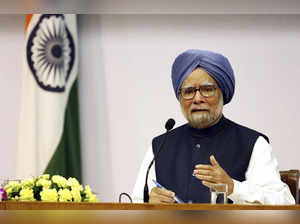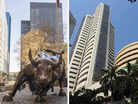 AP
APET Year-end Special Reads
Economic Reforms and Political Rise
Singh’s journey to the Prime Minister’s office began as the Finance Minister in 1991, when he implemented landmark economic reforms that played a key role in India’s integration into the global economy. His tenure as Finance Minister under Prime Minister PV Narasimha Rao is regarded as the foundation of India's economic liberalisation. Singh’s bold steps, such as reducing import tariffs and introducing economic reforms, are considered pivotal in transforming India into a global economic player.However, his later years in office were marked by challenges such as corruption scandals and rising inflation. His leadership during this period was often called into question, especially by political opponents. Despite these challenges, Singh remained steadfast in his belief that his government’s actions were aimed at India’s long-term growth, even if they were politically difficult in the short term.
Defending His Leadership
In January 2014, as his second term neared its end, Singh faced intense criticism regarding his leadership. In one of his last public interactions before stepping down, Singh addressed the allegations of weak leadership, saying, "I do not believe that I have been a weak Prime Minister. I honestly believe that history will be kinder to me than the contemporary media or for that matter the Opposition in Parliament… Given the political compulsions, I have done the best I could do."He further added, "I have done as well as I could do according to the circumstances. It is for history to judge what I have done or what I have not done." Singh’s calm defence of his leadership was consistent with his methodical approach to governance, even in the face of adversity.
Throughout his political career, Singh often made statements that sparked debate and shaped his public image. One of his most notable comments came in 2014, when he sharply criticised Narendra Modi, who was then the BJP’s prime ministerial candidate. Addressing the Gujarat riots of 2002, Singh remarked, "If you measure the strength of Prime Minister by presiding over mass massacre of innocent citizens on streets of Ahmedabad, then I do not believe in it." This statement was a direct response to the BJP’s portrayal of Modi as a strong leader, contrasting it with Singh's image as a calm, consensus-driven politician.
Also Read: Nation to observe 7-day mourning as Manmohan Singh’s final rites set for Saturday
Singh’s comments on Modi were part of a broader critique of the political climate at the time. In another statement, Singh said, "I have full confidence that the next Prime Minister will be from the UPA... It will be disastrous for the country to have Narendra Modi as Prime Minister... I sincerely believe what Narendra Modi is saying is not going to materialise." These words, spoken in the run-up to the 2014 general elections, reflected his concerns about the direction India would take under Modi’s leadership.
Years later, Singh regretted the harshness of his earlier statement. "I did say Modi will be a disaster as the PM. Now I recognise I used a harsh word I should not have used," he admitted in November 2018. This reflection highlighted his capacity for introspection, a characteristic that was also evident in his later years as he distanced himself from some of his earlier comments.
Singh’s political career was marked by a steady rise through India’s political system. Although he never contested a Lok Sabha election, he was nominated to the Rajya Sabha in 1991 and represented Assam for five terms. In 2019, he shifted to Rajasthan for his final term, which concluded in April 2024. Throughout his tenure, Singh maintained a reputation for being a committed parliamentarian. Despite declining health in his later years, he was praised for attending sessions, including one in 2024 when he appeared in a wheelchair.
His work in the Rajya Sabha, alongside his role as Prime Minister, solidified his status as a key figure in Indian politics. Singh’s tenure was not without challenges, particularly within his own party, the Congress. Despite some internal disagreements, Singh maintained that no one had ever asked him to step down due to inadequacies in his leadership. "Nobody has asked me to step down because of any inadequacy that characterised my tenure as Prime Minister," he responded when asked about negative perceptions within the Congress.
Even after leaving office, Singh remained outspoken on key policy issues, particularly those introduced by his successor, Narendra Modi. In November 2016, Singh sharply criticised the Modi government's decision to demonetise ₹500 and ₹1,000 currency notes, calling it a "monumental mismanagement." He described the demonetisation move as “a case of organised loot, legalised plunder of the common people.”
Singh’s concerns about the economic direction under Modi were not limited to demonetisation. He also criticised the Goods and Services Tax (GST) as a "twin blow to the economy," further solidifying his reputation as a leader unafraid to speak out against government policies he believed were detrimental to the country's economic health.
Manmohan Singh’s legacy is one of quiet resilience and complex leadership. While his tenure as Prime Minister was marked by political difficulties and controversies, Singh’s contributions to India’s economic liberalisation and his steady governance during times of crisis are undeniable. His calm and measured responses, even in the face of harsh criticism, highlighted his belief in the long-term impact of his decisions. As India moves forward, Singh’s place in history remains secure as a pivotal figure in shaping the country’s modern economic landscape.
(Catch all the Business News, Breaking News, Budget 2024 Events and Latest News Updates on The Economic Times.)
Subscribe to The Economic Times Prime and read the ET ePaper online.
Read More News on
(Catch all the Business News, Breaking News, Budget 2024 Events and Latest News Updates on The Economic Times.)
Subscribe to The Economic Times Prime and read the ET ePaper online.









































 Get Unlimited Access to The Economic Times
Get Unlimited Access to The Economic Times
